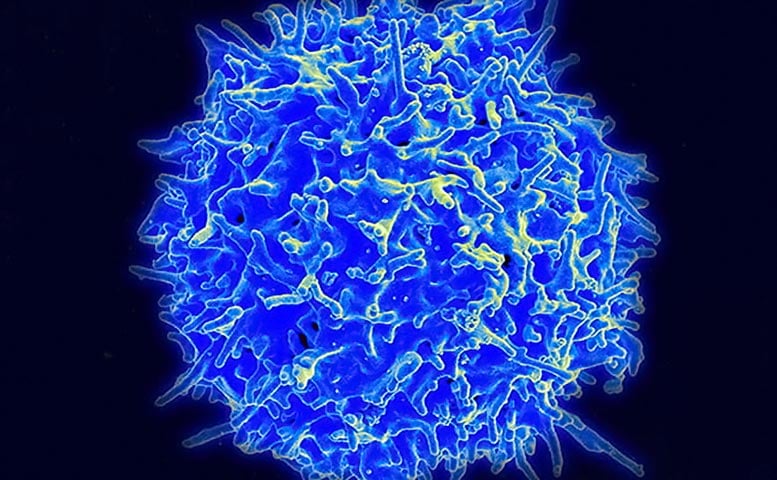Colored scanning electron microscope image of a T cell, a type of lymphocyte that plays a central role in the immune response. Image Credit: NIAID
New findings could represent a new therapeutic target and explain why IBD and other autoimmune diseases are often chronic and lifelong.
Inflammatory bowel disease (IBD) is a group of bowel diseases that affects an estimated six to eight million people worldwide. While there are many treatments for IBD, some patients do not respond long-term, leaving people with a variety of chronic problems, from abdominal pain and cramps to frequent, bloody stools.
In a new study published on August 21, 2020 in Scientific immunologyAn international team of researchers, led by scientists from the University of California’s San Diego School of Medicine, reports that IBD persistence may be due to a type of long-lived immune cell that can cause persistent, harmful inflammation in the intestinal tract.
Led by co-senior authors John T. Chang, MD, Professor of Medicine, and Gene W. Yeo, PhD, Professor of Cell and Molecular Medicine, the research team performed mRNA and antigen receptor sequencing from immune cells that Biopsies or blood from IBD patients and healthy controls were isolated from samples from the rectal.
“We took a cutting edge approach that allowed us to generate mRNA and antigen receptor sequencing data from the same single cells,” said Yeo, “and analyzed thousands of individual cells, which is very exciting.”
It has long been believed that immune system dysfunction, along with genetic susceptibility and changes in the gut microbiome, play a significant role in IBD. However, the types of immune cells involved and their specific contributions to IBD have remained unclear. CD8 + T cells are a component of the immune system that identify and kill cells infected with microbial pathogens.
When an infection is defeated, the immune system leaves behind long-lived cells called memory T cells that are found in tissues or circulate around the body and remember previous pathogens. You’re always ready to sound the alarm in case certain intruders reappear.
Chang and Yeo discovered together with co-first authors Dr. Brigid S. Boland, Dr. Zhaoren He, Dr. Matthew S. Tsai and colleagues that there appear to be several subtypes of CD8 + tissue-resident memory T (T.RM) Cells, a specific class of memory cells that are found in organs once formed.
One of these T.RM Cell subtypes have been differentiated by high levels of the transcription factor eomesodermin and programmed to produce large amounts of cytokines and other molecules to kill newly detected infected cells. The downside is that excessive, persistently high levels of some cytokines can cause inflammation and tissue damage.
“We found that this inflammatory T.RM The cell subtype appeared to be concentrated in the intestinal tissue of patients with ulcerative colitis, a form of IBD that affects the large intestine, ”said Chang. “Long-lived memory cells are a target for vaccines, but this finding suggests that the same cells that are sought after in the fight against infectious diseases can indeed be harmful in connection with IBD.”
The researchers also found evidence that this inflammatory T.RM The cell subtype may not remain limited to the intestinal tissue, but can also escape into the bloodstream.
“This could explain why IBD can affect many other parts of the body as well as the gut,” said Boland, a gastroenterologist at UC San Diego Health and associate professor of medicine.
Chang said the results could help explain why IBD is chronic, lifelong, and suggest the possibility of a cure in the future: targeting this inflammatory T.RM Cell subtype for elimination, thereby ending the cycle of inflammation and tissue damage.
The researchers found that much more work is needed to gain a deeper understanding of the role of T cells in tissues in IBD and to determine whether they can be used therapeutically.
Reference: “Heterogeneity and clonal relationships of adaptive immune cells in ulcerative colitis by single cell analysis” Brigid S. Boland, Zhaoren He, Matthew S. Tsai, Jocelyn G. Olvera, Kyla D. Omilusik, Han G. Duong, Eleanor S. Kim, Abigail E. . Limary, Wenhao Jin, J. Justin Milner, Bingfei Yu, Shefali A. Patel, Tiani L. Louis, Tiffani Tysl, Nadia S. Kurd, Alexandra Bortnick, Lauren K. Quezada, Jad N. Kanbar Ara Miralles, Danny Huylebroeck, Mark A. Valasek, Parambir S. Dulai, Siddharth Singh, Li-Fan Lu, Jack D. Bui, Cornelis Murre, William J. Sandborn, Ananda W. Goldrath, Gene W. Yeo and John T. Chang, August 21, 2020 , Scientific immunology.
DOI: 10.1126 / sciimmunol.abb4432
Co-authors are: Joselyn G. Olvera, Kyla D. Omilusik, Han G. Duong, Eleanor S. Kim, Abigail E. Limary, Wenhao Jin, J. Justin Milner, Bingfei Yu, Shefali A. Patel, Tiani L. Louis Tiffani Tysi , Nadia S. Kurd, Alexandra Bortnick, Lauren K. Quezada, Jad N. Kanbar, Ara Miralles, Mark A. Valasek, Parambir S. Dulai, Siddarth Singh, Li-Fan Lu, Jack D. Bui, Conelis Murre William J. Sandborn and Ananda W. Goldrath, all at UC San Diego; and Danny Huylebroeck, University of Leuven, Belgium and Erasmus University Medical Center, Netherlands.
Funding for this research came in part from the National Institutes of Health (grants P30KC063491, P30CA023100, S10OD026929, NS047101, S10OD018499, TR001444, DK123406, DK007202, AI082850, AI00880, AI123202, AI00812342, AI123202, AI00812342, AI center for digestion sickness P30DK120515) and grants to support the Cancer Center (grant P30CA23100) and the Kenneth Rainin Foundation.



